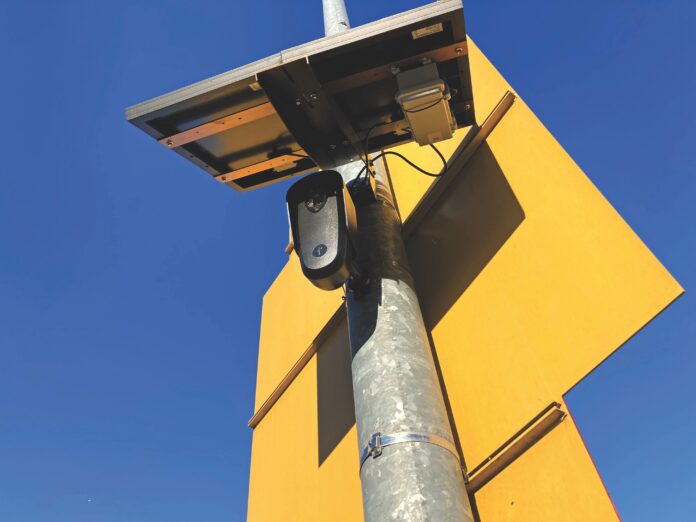
The Los Gatos-Monte Sereno Police Department has promoted its network of the license plate readers it’s set up around town to monitor traffic and alert it to vehicles deemed suspicious, handing out awards to officers who’ve used the cameras to crack cases and highlighting it in Council reports.
But as the end of the two-year trial period nears for the devices from Atlanta-based Flock Safety, some police accountability researchers are questioning whether Los Gatos should re-up with the technology provider, given the privacy intrusions and security risks.
“License plate readers are mass surveillance technology,” said Dave Maass, director of investigations for the Electronic Frontier Foundation, a civil liberties nonprofit. “They collect data on everyone.”
A California Public Records Act inquiry filed by the organization found the local police force is getting cues from 16 agencies about who to track with Flock’s Automated License Plate Recognition system when their vehicle shows up in Los Gatos.
In responding to the public records request, the department said it “does not share data through an automated process” with others.
“LG/MSPD’s fifteen cameras read and capture an image of approximately 450,000 unique license plates per month,” reads the response, which notes the images are deleted after 30 days unless one appears to be connected to a criminal activity.
The network “has proactively sent the department alerts for approximately 300 vehicles associated to crimes in 2022 and there is reason to believe approximately 100 crimes have been solved or specifically prevented in the first 11 months of 2022 as a result of the data generated by the Flock ALPR system.”
only around .005% of vehicles Spied on by license plate readers in Los Gatos ENd Up Being deemed connected to Crime
But Maass says, in the 30 days leading up to Nov. 9, in order to find just 23 vehicles that might have been involved in a crime, the dragnet had to photograph 458,411 plates.
“If you do the math on that, that means that only .005% of the vehicles were relevant to a crime,” he said. “That’s not even a 10th of a percent.”
In the meantime, the department has the ability to develop a comprehensive—though temporary—map of the lives of innocent local residents, according to Maass, noting this could be subject to a security breach.
“Think about how much you drive in 30 days,” he said. “That can be used to build a pretty detailed picture of your travel patterns.”
Flock’s privacy policy allows it to share the data it stores with government agencies in response to legal requests such as subpoenas or warrants.
In a recent report by the Guardian newspaper, Joshua Thomas, a Flock vice-president, was asked about how the company would handle abortion-related investigations in the wake of the Supreme Court’s Dobbs decision that struck down the constitutional right to the procedure.
“Flock’s mission as a business is to eliminate crime,” he said. “Our position at Flock remains consistent in response to the Dobbs decision. Our perspective is that we do not enact laws, and our mission is not specific to any particular laws.”
Maass says even though the local department claims it doesn’t share license plate files with other jurisdictions, because Flock is based in Georgia—where abortion is illegal after around six weeks—there’s no reason why law enforcers there couldn’t demand police here supply information about someone who’d visited Los Gatos seeking to end a pregnancy.
Critics Worry surveillance tech could be used to Hunt down abortion Seekers from elsewhere, as Flock Safety is Based in GeorgiA, where the procedure Is illegal Around 6 Weeks
“They can hand over data if they want to,” he said, adding Silicon Valley leaders have been among the most concerned with the reach of surveillance tech. “Steve Jobs famously used to drive a new car on a regular basis so he could conceal his license plate.”
Rachel Richards, a police transparency researcher who says she’s been harassed by law enforcement in New York—and who recently passed through the Los Gatos area herself—notes the technology is powerful and potentially harmful.
“It’s casting an extremely wide net, and it’s catching a lot of personal information and data,” she said. “Will we now start tracking people in states where abortion is illegal?”
Recent court decisions in New York and Chicago have shone a light on how police inappropriately responded to Black Lives Matter demonstrations and have begun to place limits on the unencumbered use of spy tech, she adds.
“People were being surveilled with the specific intent to silence them,” she said of how digital tools were used against racial justice activists. “The implications of this technology are going to manifest themselves in ways we can’t even imagine.”
That’s why it’s so important to lay down ground rules before things go off the rails, according to Richards.
“The time to put those measures in place is now,” she said. “This is not a police state. This is not an autocratic society—yet.”
The way Los Gatos police officials put it, its license plate surveillance helped resolve around 100 cases, compared to the approximately 2,000 crime reports it receives each year—a 20% rate.
However, this statistic includes what Police Chief Jamie Field considers one of the greatest benefits of the system—that it not only can help solve crimes, but that it also scares people off who have yet to break the law in Los Gatos.
She outlined her view, during a Jan. 17 report to Council, in response to a question from Councilmember Matthew Hudes about the usefulness of the technology.
“It really provides us with a smart-deployment pattern, because as we are alerted to those vehicles coming into town that may be involved in some kind of criminal activity…it’s able to alert, immediately, our dispatch center—and all of our deployed resources—to that area,” she said. “We have been able to prevent crime from occurring here, and I mention that because that’s something that’s very difficult to measure.”
Capt. Derek Moye echoed the sentiment, noting when Los Gatos learns of suspects arriving on Los Gatos’ doorstep, the idea is to give those “bad players” the feeling that, “‘Oh my gosh, Los Gatos has 20,000 cops,’” causing them to turn around.
“I’m trying to figure out a way to measure how many times that happened, and all the crime we prevented,” he told Council. “Because when people have these stolen vehicles, they’re not out to joyride, they’re out to commit crimes—that’s why they do it.”
Critics—like the American Civil Liberties Union—fear new high-tech tools will only end up exacerbating America’s entrenched problem with racial inequality, something highlighted in the data presented during the same report.
According to Field’s presentation, between July and December 2022, more than half (52%) of the people stopped by Los Gatos-Monte Sereno police—684—were white, while 27%—358 people—were perceived to be Hispanic or Latino.
That was followed by 155 people categorized as Asian (9%), 99 people perceived as Middle Eastern or South Asian (7% of stops), 58 Black people (4%), 9 Pacific Islanders (1%), and 2 deemed Native Americans (less than 1%).
According to the U.S. Census, Los Gatos is made up of 70.1% white people, suggesting these residents are being stopped by local police at a disproportionately lower rate. As Hispanic or Latino people make up just 8.3% of Los Gatos’ population, it appears these residents are experiencing forced interactions with police at a much higher rate than people of other backgrounds.
Meanwhile, with Asian residents making up 16.8% of the town’s population, it seems this demographic group is getting stopped disproportionately less frequently by law enforcement.
Of course, the local force patrols an area that extends beyond Los Gatos’ geographical boundaries, and community members don’t just include people who live here.
Last June, The Marin County Sheriff Settled a Lawsuit After illegally sharing license plate and location data with Immigration Officials
During the same period, 31% of stops in Los Gatos by police were of females (396), compared with the 50.9% of Los Gatans who identify as female; 890 stops were of males (69%), followed by five of transgender males and two of transgender females.
Last June, the ACLU Foundation of Northern California announced it had settled its lawsuit against former Marin County Sheriff Robert Doyle, after his office illegally shared license plate and location information—captured by its network of surveillance cameras—to hundreds of federal and out-of-state agencies, including Immigration and Customs Enforcement and Customs and Border Protection.
One public commenter at Council in Los Gatos wondered why local officers have been stopping people from some racial groups at a much higher rate than others.
“It appeared to me that the ratio was about 50/50 in terms of people of color versus whites that were being pulled over,” said John Shepardson, a lawyer who lives in Los Gatos. “I wanted to know if there was any consideration of why that was taking place. Because my understanding (is) that’s different than the demographic in town, although I realize that we have a number of people that drive through the town that don’t live here, but maybe work here.”
However, Shepardson said he supports the Flock program.
“I was encouraged by that,” he said. “An idea that I thought of, that if the Town goes forward with that, that it might actually even sort of advertise—that this is a ‘Flock surveillance community’ and put that message out as a further deterrent.”
Hudes asked Field if the speaker had been interpreting the race data correctly.
“While it may not be exact what our demographics are in town, we also recognize that we have a lot of folks that come to the community to work, to visit, and for many other purposes as well,” Field said, noting the information is based on officers’ perceptions. “But there’s no further evaluation at this time.”
Councilmember Rob Rennie asked about the $40,000 per year price tag to sign up with Flock, following the trial period.
Field said the first couple years of service were paid for by the State’s Supplemental Law Enforcement Services Fund.
“That was something that was going to have to be evaluated this year should Flock be a piece of technology we would like to continue forward with,” she said. “Then we would have to build that into the budget for fiscal 23-24.”









